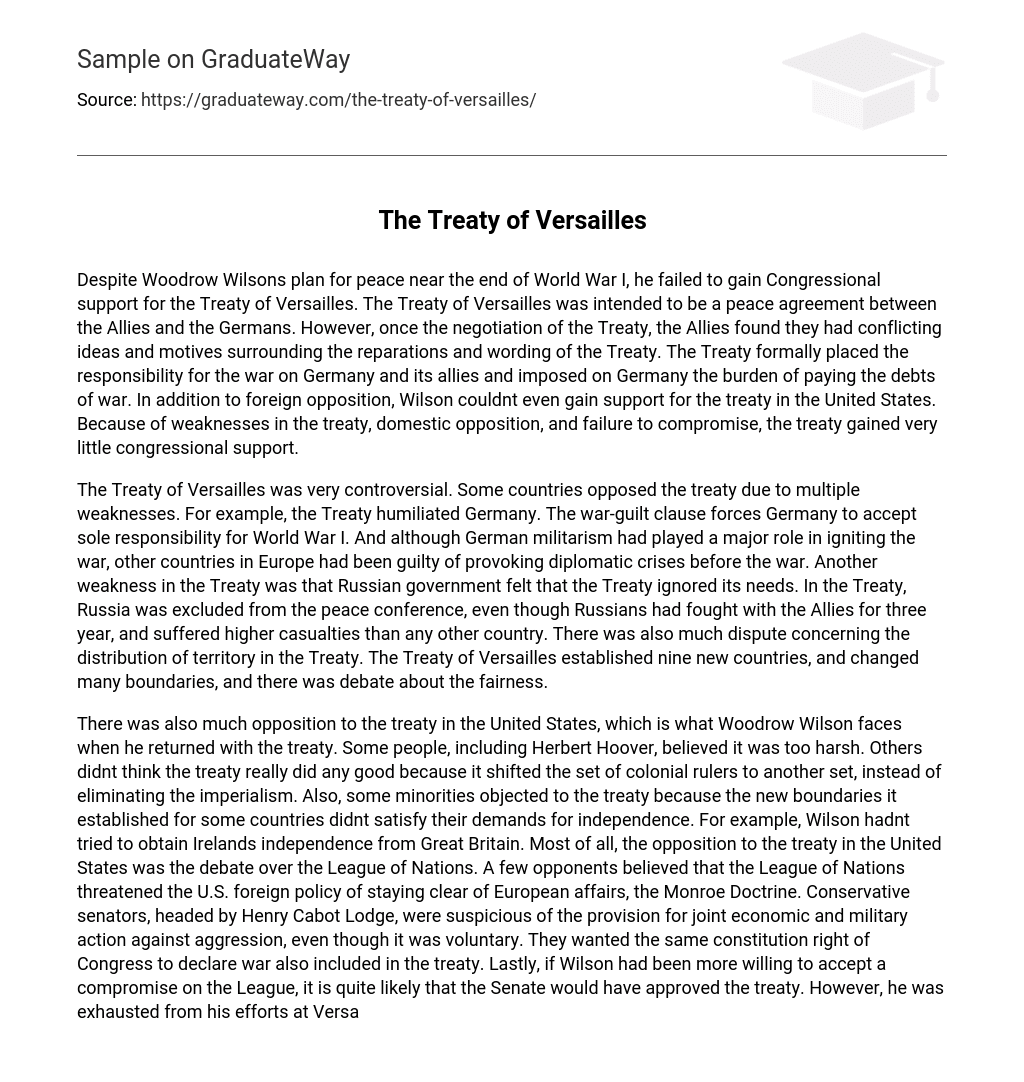Despite Woodrow Wilsons plan for peace near the end of World War I, he failed to gain Congressional support for the Treaty of Versailles. The Treaty of Versailles was intended to be a peace agreement between the Allies and the Germans. However, once the negotiation of the Treaty, the Allies found they had conflicting ideas and motives surrounding the reparations and wording of the Treaty. The Treaty formally placed the responsibility for the war on Germany and its allies and imposed on Germany the burden of paying the debts of war. In addition to foreign opposition, Wilson couldnt even gain support for the treaty in the United States. Because of weaknesses in the treaty, domestic opposition, and failure to compromise, the treaty gained very little congressional support.
The Treaty of Versailles was very controversial. Some countries opposed the treaty due to multiple weaknesses. For example, the Treaty humiliated Germany. The war-guilt clause forces Germany to accept sole responsibility for World War I. And although German militarism had played a major role in igniting the war, other countries in Europe had been guilty of provoking diplomatic crises before the war. Another weakness in the Treaty was that Russian government felt that the Treaty ignored its needs. In the Treaty, Russia was excluded from the peace conference, even though Russians had fought with the Allies for three year, and suffered higher casualties than any other country. There was also much dispute concerning the distribution of territory in the Treaty. The Treaty of Versailles established nine new countries, and changed many boundaries, and there was debate about the fairness.
There was also much opposition to the treaty in the United States, which is what Woodrow Wilson faces when he returned with the treaty. Some people, including Herbert Hoover, believed it was too harsh. Others didnt think the treaty really did any good because it shifted the set of colonial rulers to another set, instead of eliminating the imperialism. Also, some minorities objected to the treaty because the new boundaries it established for some countries didnt satisfy their demands for independence. For example, Wilson hadnt tried to obtain Irelands independence from Great Britain. Most of all, the opposition to the treaty in the United States was the debate over the League of Nations. A few opponents believed that the League of Nations threatened the U.S. foreign policy of staying clear of European affairs, the Monroe Doctrine. Conservative senators, headed by Henry Cabot Lodge, were suspicious of the provision for joint economic and military action against aggression, even though it was voluntary. They wanted the same constitution right of Congress to declare war also included in the treaty. Lastly, if Wilson had been more willing to accept a compromise on the League, it is quite likely that the Senate would have approved the treaty. However, he was exhausted from his efforts at Versailles, and as a result, became more cold, aloof, and rigid than ever, and he refused to agree with any compromises. His exhaustion caused him to have a severe stroke in October of 1919, making him invalid for the rest of his life. Wilson could have smothered the concerns of Senators such as Lodge if he had chosen the membership of the American delegation more carefully. When the treaty came up for vote in the Senate in November of 1919, Lodge introduced a number of amendments, the most important of which qualified the terms under which the Untied States would enter the League of Nations. Lodge and a large group of senators feared that U.S. membership in the League would force the U.S. to form its foreign policy in accord with other member of the League. Although the Senate rejected the amendments, it also failed to ratify the treaty. At the close of World War I, the League of Nations was established, but it did not have a large amount of power, and it didnt function well enough to prevent international problems from occurring, or to resolve them when they occurred. However, many of his fourteen points were carried in the Treaty. This way, Wilson was successful in establishing a League of Nations, however, he was not successful in convincing his own country to join in having the organization have a sufficient amount of power to be considered a strongly influential force internationally.





